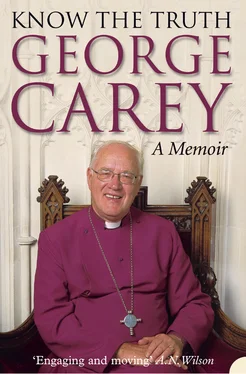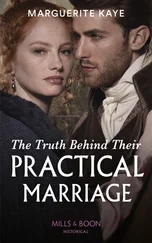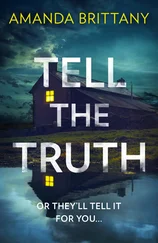Actually, I was not the slightest bit ashamed of my working-class background, which I shared with at least 60 per cent of the population. The popular press had of course milked the story thoroughly, and it was the usual tale of ‘poor boy makes good’ by overcoming huge obstacles to ‘get to the top’. How I hated that kind of language of ‘top’ and ‘success’. It encouraged the stereotype that I was a ‘man of the people’, and therefore in tune with the vast majority of the populace. There was no logic in that, as a moment’s thought should have reminded such journalists that David Sheppard’s background – to take one example of many – did not prevent him from being closely in touch with the underprivileged. Nevertheless, I hoped with all my heart that it was true, and it was very much at the centre of my ministry to represent the cares and interests of ordinary people, with whom I could identify in terms of background.
Some writers, astonishingly, had drawn the conclusion that because I came from an evangelical background my politics were essentially conservative. That was clearly not the case, but neither did it mean that I automatically identified with any particular political party. I saw my role as Archbishop as a defender of the principles of parliamentary democracy. I wanted to support those called to exercise authority, and I would later remind Prime Ministers of both major parties that I saw it as my duty to confront them if they embarked upon policies which I felt undermined the nation in any way.
But what kind of Archbishop was I going to be? As the 103rd Archbishop I was spoiled for choice if modelling myself on any of my predecessors was the way to proceed. Becket feuded so regularly with his King that he spent most of his time in exile. No, that was not for me. The quiet, scholarly Cranmer, perhaps, with whose theology I could identify; but, then again, he was too vacillating and cautious. Nearer my time perhaps one of the greatest of them all, William Temple – scholar, activist, social reformer and inspirer. Yes, a giant among Archbishops, but he was Archbishop of Canterbury for a mere two years during wartime. As a model for this post there were many great men to consider. It struck me that whatever inspiration I received from my illustrious predecessors, I had to be my own man. One thing I could depend upon was that the same divine grace and strength that the previous Archbishops had received was available to me too.
‘It’s time to go, Archbishop,’ said a smiling Graham, handing me my mitre, and then with a prayer we walked towards the door, leaving the television commentary still describing the scene within the cathedral as we advanced to be part of it.
‘Perhaps more typical of the period after 1940, when the war settled down into the long slog that it became for most non-combatants is the comment of an old lady from Coventry. Asked by her priest what she did when she heard the sirens, she replied: “Oh, I just read my bible a bit and then says ‘bugger ‘em’ and I goes to bed.” ’
W. Rankin
THE WORLD INTO WHICH I WAS BORN on 13 November 1935 was a very troubled and insecure one. The nations were just emerging from the effects of the devastating Wall Street crash that had led to thousands of bankruptcies and to the ruin of many millions of ordinary people around the world. Europe had been badly affected by the Depression, and the rise of fascism was beginning to trouble many. The United Kingdom was not immune from the turmoil and confusion of the period, with unemployment blighting the lives of millions. An absorbing and important sideline was the worrying problem of the monarchy, that would very shortly lead to the abdication of Edward VII and the accession to the throne of George VI.
To what extent my working-class parents shared in these questions and concerns I have no knowledge, although poverty was an abiding reality in our home. Number 68 Fern Street, Bow, London E3, was a typical working-class terrace house, with two bedrooms and a toilet upstairs, and two rooms and a scullery downstairs. I never heard my parents complain about their council home. They kept it clean and were proud of it.
It was a very happy and loving home into which I was born. I was the eldest of five children. Dennis, the twins Robert and Ruby, and Valerie followed at roughly two-year intervals. It was our privilege to have two wonderful parents.
To outward appearances, there was nothing remarkable about them. Their marriage certificate declared that our father, George Thomas Carey, was a labourer at the time of my birth. His schooling had stopped at fourteen years of age, and from birth until well into his teenage years he was the beneficiary of cast-off clothes and shoes. His background was impressive only for the extent of its poverty and deprivation. He was eight months old when his father died in St Bart’s Hospital as a result of an appendicitis operation at the age of twenty-five. His earliest memory was of his mother’s second marriage to an Irish Roman Catholic, a street trader, who was habitually drunk and who often beat his wife when under the influence of alcohol.
In addition to his older brother John, Dad’s mother gave birth to a further eight children. She only married her Catholic husband on the clear understanding that the two sons of her first marriage were brought up in the Church of England faith. She often took them to Bow Church, which to this day occupies a position of prominence on Mile End Road.
My father told me that two moments of his childhood stand out. His maternal grandparents were both born blind, and when his grandmother passed away his grandfather joined this already very large family. The cramped house necessitated grandson and blind grandfather sharing a single bed. A close relationship grew between them, and the old man devoted many hours to teaching the boy to read. My father was encouraged to recite huge passages of the Bible that later in life he could still recall and repeat. At the age of ten, Dad was due to go on a school trip to Regent’s Park Zoo. The day before the trip, Granddad gave his daughter some money, with the mysterious instruction that should anything happen to him, nothing should stop George going to the zoo. Dad was suddenly woken up during the night and transferred into another bed without knowing why. On his return home from the zoo the following day his mother told him gently that his dear grandfather had died in the night with his arms around him. A very special bond was broken – but Dad remained devoted to the memory of his blind grandfather throughout his life.
Dad’s second memory was of a night in his early teens when he was woken by loud screaming and the sound of breaking furniture. Fearfully he crept out of bed, and struggled downstairs. The screaming was his mother’s. Candles were the only form of lighting, so it was with some difficulty that he found his way to her bedroom. Suddenly, confronting him was his stepfather, breathing heavily and clearly the worse for drink.
‘What’s the matter, Georgie?’ came the harsh voice.
‘I heard Mum scream, and it frightened me,’ the boy said.
His stepfather replied, ‘Go to bed, George. Your mother is all right.’
The following day he found out that his older brother had also heard the screaming and had pulled their drunken stepfather off their mother, who had been savagely beaten. He in turn was practically strangled before Nell, one of the stepsisters, was able to rescue him. Mother, son and stepdaughter were thrust from the house and spent the remainder of the night at an uncle’s home. The battered face of his mother the following day told the sorry story of the power of drink in his stepfather’s life. Apparently he could be the most charming of men when sober, but rarely did my father talk of him. There was, however, no mistaking the depth of the love between my father and his mother. Although I have no recollection of her whatsoever, the fragrance of her presence was almost tangible in my father’s life. Few of us realise how lasting is the impact that such caring and close relationships have on our children.
Читать дальше












